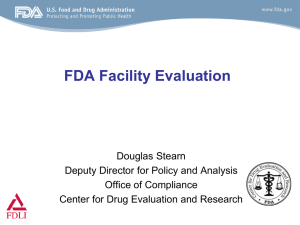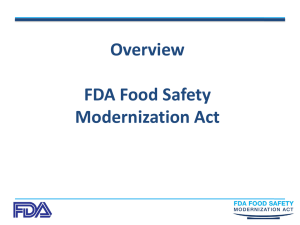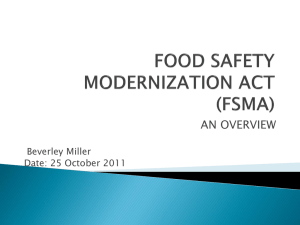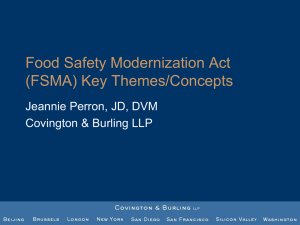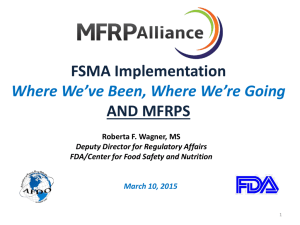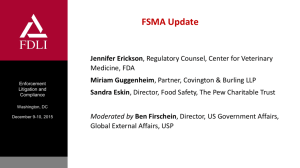Scope of Inspection - Food and Drug Law Institute
advertisement
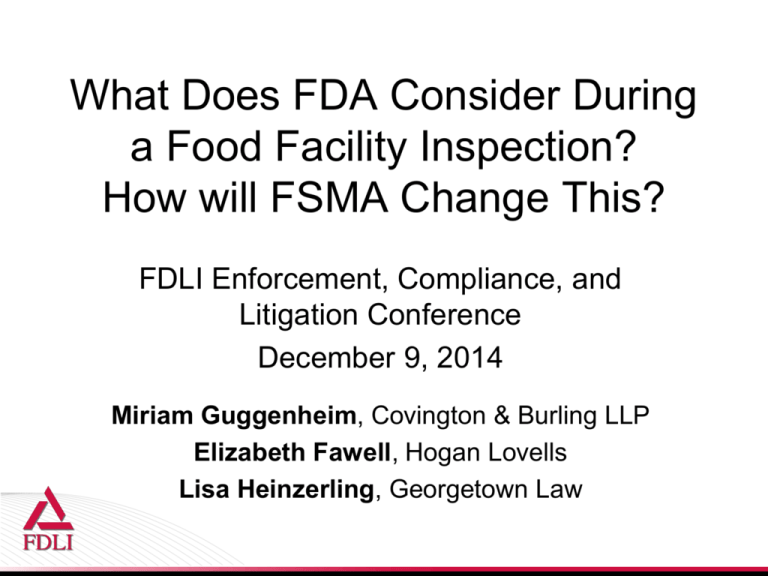
What Does FDA Consider During a Food Facility Inspection? How will FSMA Change This? FDLI Enforcement, Compliance, and Litigation Conference December 9, 2014 Miriam Guggenheim, Covington & Burling LLP Elizabeth Fawell, Hogan Lovells Lisa Heinzerling, Georgetown Law What does FDA consider during a food facility inspection? • GMPs – Allergen controls are a priority • Compliance with any special programs – Seafood/juice HACCP – Low acid/acidified foods – Infant formula • Labeling/claims 2 Scope of Inspection • Broad scope of physical inspection: – FDA inspector may “enter, . . . any factory, warehouse, or establishment in which food[s] . . . are manufactured, processed, packed, or held, for introduction into interstate commerce” or any “vehicle, and all pertinent equipment, finished an unfinished materials, containers, and labeling therein.” • Currently, a limited scope of records inspection: – records documenting the movement of food in interstate commerce – records relating to reportable food registry reports – records relating to compliance with special programs (seafood, juice, bottled water, infant formula, LACF/AF) – limited records access authority in SAHCODHA situations • FSMA will turn this upside down 3 Hazard Analysis and Preventive Controls • FSMA requires that facilities put in place and document a food safety plan that describes the company’s: – hazard analysis – preventive controls – procedures to monitor effectiveness, corrective actions, and methods to verify effectiveness. • Facilities must maintain records relating to the plan and these activities for at least two years and make them available to FDA upon written or oral request, including during routine inspections 4 Hazard Analysis • Must identify/evaluate known or reasonably foreseeable hazards that may be associated with a facility, including – biological, chemical, physical, radiological hazards – natural toxins – pesticide and drug residues – unapproved food/color additives – allergens – hazards naturally occurring or intentionally introduced • Must document analysis 5 Preventive Controls • Must identify and implement validated preventive controls – to significantly minimize or prevent identified hazards • Must monitor and verify that preventive controls are effective, and take corrective action when needed • Preventive controls are . . . 6 – risk-based procedures, practices, and processes – that a person knowledgeable about safe food manufacturing/packing/holding would employ – consistent with current scientific understanding of safe food manufacturing/handling Implications of FSMA for Inspections • Inspections will be very heavily document-focused • Violations will occur for failure to conduct and document appropriate analyses and procedures – Consider history regarding warning letters for dietary supplement GMP violations 7 Implications of FSMA for Inspections • Companies’ decisions about risks and their control will become much more exposed to scrutiny (and second-guessing?) by inspectors – Flexibility in FSMA/rulemaking may be a doubleedged sword • “Risk based”? • “Reasonably foreseeable”? • “As appropriate to the facility”? – Rulemaking and guidance development process is the time to seek clarity to (hopefully) avoid debates with inspector 8 FSVP Records • Determination of verification activity/risk evaluation • Documentation of the verification activity (FDA sets out minimum requirements for the contents): – Audits – Testing – Review of records – Letters from customers/suppliers • Corrective actions • “List” of suppliers Key Issue: Where review will take place 9 Sanitary Transportation of Food • FDA is not requiring maintenance of records for each shipment • Shippers must maintain: – Records that document the sanitary and temperature control requirements specified to the carrier • Carriers must maintain: – Any written agreements with the shipper that assign responsibility for temperature monitoring or regarding bulk vehicle cargoes and cleaning – Written procedures – Training records 10 Other FSMA Issues • Suspension of Registration • Mandated inspection frequency based on risk • Reinspection fees 11 How Will Inspections Change? • New Inspection Paradigm – FDA to develop inspection cadre specially trained in and devoted to food inspections – Systems-based approach • “Culture of food safety” – Heavily dependent on records review – Closer integration of field inspectors and HQ experts – Rapid enforcement action if high risk to public health identified 12 FDA Culture is Changing • FSMA implementation is occurring just as FDA culture is changing • FDA is rapidly becoming: – More inspection-oriented – More enforcement-minded 13 FDA is More InspectionOriented • FDA is: – Conducting more domestic inspections (with the states) – More strategic about selecting inspection sites – Posting some 483s on website – Expanding definition of “high risk” – Testing more, both environmental and finished product – Increasing oversight of imports, especially ingredients, and conducting foreign on-site inspections Enforcement is on the Rise • • • • Increase in Warning Letters Increase in court injunctions Heightened use of Import Alerts Expanded use of Park Doctrine on the horizon • New “deficiency letters”? Impact for Inspections • Inspections have already changed: – FDA is energized and persistent and will note all possible violations as inspectional observations – FDA will demand access to records the agency lacks the legal authority to access – FDA will try hard to take photographs even without express legal authority – Inspections involve comprehensive environmental sampling (“swab-a-thon”) 16 What to Do • Know your rights • Start preparing now for FSMA inspections 17
